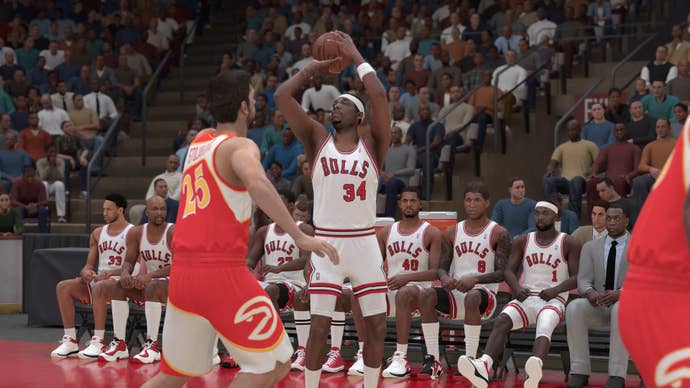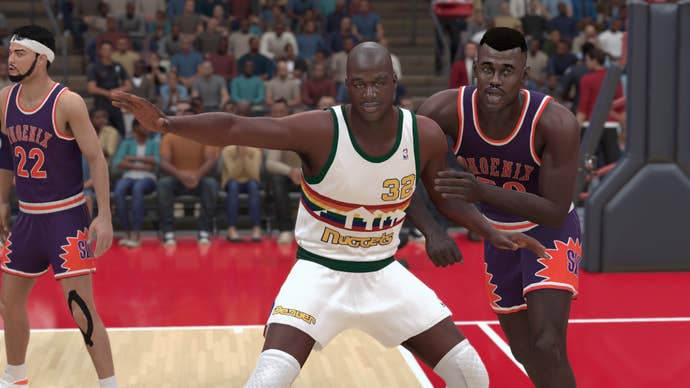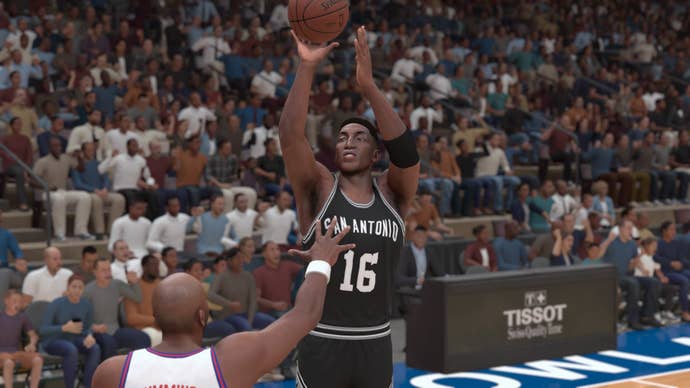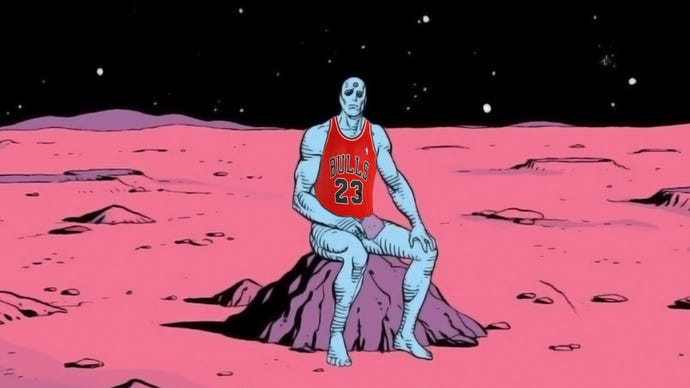NBA 2K24's fine, unless you want to break time itself so hard the ultimate NBA All-Star straight-up disappears
Here’s the tale of the people who’re condemned to be in short shorts forever.
It’s June 2003.
Just last month, in the real world, Michael Jordan - the most famous basketball player of all time - said goodbye to playing that sport professionally for the third and final - as of writing - time. He was in Philadelphia and no longer wearing that famous number 23 for the Chicago Bulls, but he still got a lengthy standing ovation from everyone in the building.
Here, though, the playoff crowd that’s packed into Chicago Stadium almost a decade after it was demolished are sick to their stomachs. Paul Pierce has just drained a three pointer with 38 seconds to go in a game seven, but it means nothing. The New York Knicks have a double-digit lead. The Bulls have run out of time to make a comeback, and they won’t get another.
Was Chicago’s NBA team coming off of a near decade of utter domination, it wouldn’t sting so badly, but it does, because that isn’t the case. To get to the bottom of why, we have to ask a very important question.
Why are so many people still wearing short shorts?
I’ll start off my answer by taking you back to 1998. A Seattle SuperSonics team that’s got far too many point guards - including both Jason Kidd and Penny Hardaway - is romping to victory over the Milwaukee Bucks to cement itself as the league’s top dog. The seasons of just 22 other teams, rather than 28, all end in defeat and disappointment. The Bulls are one of these teams, finishing with a record of 26 wins and 56 losses as the third worst team in the entire league.
In a season when they should have won 62 games, they end up with the consolation prize of drafting Pierce third overall, having had no chance to luck their way into one of the top two selections that’d have afforded them even more choice when it came to selecting one of the country’s most highly-rated prospects. As it stands, they’ve not done too badly anyway, as the man who’ll come to be known by the nickname ‘The Truth’ is a bonafide star in the making. He’ll come to compliment Shareef-Abdur Rahim, the addition that awaited Chicago at the end of a 32-50 1996 season that should’ve been a 72-10 campaign that would have stood as a record until 2016, pretty well.

The NBA landscape surrounding this gradually expanding young group is full of other familiar faces from the 1990s NBA. There’s the unmistakable Shaquille ‘The Diesel’ O’Neal, decked out in a rainbow-striped Denver uniform, Hakeem ‘The Dream’ Olajuwon dressed in the black and crimson of the Portland Trail Blazers, and Karl ‘The Mailman’ Malone, who’s currently delivering post in the big apple. Both Kobe ‘The Black Mamba’ Bryant and Allen ‘The Answer’ Iverson have arrived and are beginning to weave their legacies into the tapestry of basketball folklore, albeit having swapped jerseys.
The All-Star cast of a sport that’s arguably designed to allow for and embrace the concept of the singular star more than any other team-based game are rhythmically taking and departing the stage just as they should. But something feels wrong. And I can pinpoint exactly when I first noticed that it did.
October 28, 1988. The Bulls are coming off a 27-55 season and are hoping that adding fourth overall pick Rod Strickland to the team will help them gain ground in a league still dominated by Magic Johnson’s Lakers, Larry Bird’s Celtics, and Moses Malone’s Sixers.
I can’t find Michael Jordan.

He was here a minute ago, averaging over 30 points a game for Chicago over the 1987/88 season to lead the NBA in scoring for the second straight year. I’ve looked everywhere. I’ve even searched for his last name, but there are only two Jordans left in basketball, neither of which are him. One of them’s called Jeff and isn’t even real, for Pete's sake.
I’ve got no idea where Mike’s gone, but he’s definitely not in the NBA anymore.
I think I might know why. Since this NBA 2K My NBA Eras mode save kicked off in 1984, I’ve been stopping the relentless flow of time itself from impacting the league. Sure, years have still gone by, but nothing’s changed, no new expansion teams have arrived, none of the rule changes that came to pass in the real world have been applied, and none of the uniforms or courts being used by the existing teams have been updated.
It’s 1984 forever, and in a way that'd make George Orwell p**s his pants if he was into hoops.
That’s why, in 2003, a lot of teams are still wearing 80s-style short shorts, rather than the iconic and/or stylish 90s or early 00s threads they should be. And I think it’s what scared away Michael Jordan, the NBA’s biggest ever star and the phenomenon that helped spearhead its growth into a global cultural force, a worldwide game. He saw that things were never going to move forwards, no matter how hard he tried to drag the league towards becoming the one we know in real life today, and he just decided not to bother sticking around to be the figurehead of this version of reality’s Jordan era.
I don’t really blame him.

And to be fair, life’s still gone on. Champions have risen and fallen, albeit not fronted by an absolute force of nature in red and white who’ll one day become the main subject of a Netflix series some of his former teammates will think is a bit too focused on him. The Knicks have won three titles since 88’, ensuring that Karl Malone won’t retire as a star denied a ring by a reign of terror that hasn’t happened. Those aforementioned Sonics have grabbed three of their own and were the only team to successfully defend a title in the 90s. A San Antonio Spurs team led by one of Jordan’s most famous foes, Patrick Ewing, and number 23’s most famous co-star, Scottie Pippen, won it all in 1993.
All the while, a lack of new teams being added to it has seen the stagnant league amass more quality talent that it can handle, leading quality starters at and around 80 overall to end up having to sign one year minimum salary deals once the season’s already begun. With benches stocked with established players, some rookies have to wait years to actually make their NBA debuts. This also affects some veterans, who retire early after being unable to find a spot on one of the 23 packed rosters.
It’s a sad state of affairs, and through it, the Jordan-less Bulls play out their very own last dance. It’s a quest to win their version of the franchise’s first championship before the real Jordan hangs them up for good in 2003.
You already know how it ends.

